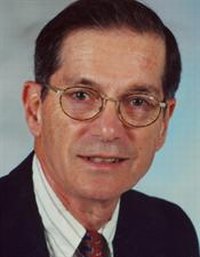American Society of Clinical Oncologists to Honor James P. Wilmot Cancer Center Physician
American Society of Clinical Oncologists to Honor James P. Wilmot Cancer Center Physician

John M. Bennett, M.D.
John M. Bennett, M.D., an international expert in leukemia, has been named the 2011 recipient of the B.J. Kennedy Award and Lecture for Scientific Excellence in Geriatric Oncology. The award is given by the American Society of Clinical Oncologists (ASCO) and will be presented at the group’s 47th Annual Meeting, which will be held June 3-7, in Chicago.
The B.J. Kennedy Award honors individuals who have demonstrated outstanding leadership or contributed outstanding scientific work — laboratory, clinical or epidemiologic — of major importance to the field of geriatric oncology. The award is named for ASCO Past President B.J. Kennedy, MD, FACP, a pioneer in the field of geriatric oncology who also helped promote the recognition of medical oncology as a subspecialty of internal medicine.
Bennett, professor emeritus of oncology in medicine, laboratory medicine and pathology at the James P. Wilmot Cancer Center at the University of Rochester Medical Center (URMC), has advocated for the integration of geriatrics into the study and practice of oncology for more than two decades. His leadership role in geriatric oncology is especially important as two-thirds of cancer diagnoses and 70 percent of all deaths occur in people 65 and older, the most rapidly growing segment of the U.S. population.
A hematologist by training, Bennett joined the faculty of the University of Rochester as head of the division of hematology/oncology at the Highland Hospital in 1969. In 1974, he became the clinical director of the University of Rochester’s cancer center, a position he held for 20 years. In this role, he learned more about how a person’s age affected their experience with cancer and cancer care.
“Over the course of decades of treating cancer patients, it became increasingly apparent that the attitudes and perceptions of clinicians were different with respect to older patients as compared to younger patients,” Bennett said. “Most clinical data used to measure the effectiveness of a particular treatment was gathered from young and middle-aged patients who were relatively fit when compared to an elderly population. There was little research that focused on seniors.”
In the late 1990s, Bennett led the development of a new program that would allow young oncology fellows to train and be certified in both geriatrics and medical oncology. Fellows in the proposed program would complete rotations in geriatric clinics and hospice programs, and also would have dedicated research time to develop programs of cancer care for the unique needs of elderly patients.
“We wanted to develop a whole new generation of young faculty who would be able to instruct medical oncologists, house staff, and medical students in the intricacies of how to care for older patients with cancer,” Bennett said.
Bennett was instrumental in securing funding from the John A. Hartford Foundation for the new training program, which was piloted at 12 cancer centers around the U.S. After the success of these initial programs, Bennett formed a special partnership with ASCO to expand the training program. He also convinced the American Board of Internal Medicine (ABIM) to approve the joint program in geriatrics and medical oncology. As a result, the ABIM made certification in geriatrics available to doctors training in all specialties.
Bennett has held a number of leadership positions throughout the world, including serving as the first chair of The Myelodysplastic Syndromes Foundation, and as a founding member of the International Society for Geriatric Oncology. He is currently editor-in-chief of Leukemia Research journal and serves on the editorial boards of several additional journals. He has published more than 500 articles and chapters.
A graduate of Harvard College, Bennett earned his medical degree at Boston University and completed his residency at Beth Israel Hospital in Boston. He completed a hematology Fellowship at Tufts University/Boston City Hospital and later served as head of the morphology/cytochemistry section at the National Institutes of Health Clinical Center before moving to Rochester.
* The above story is reprinted from materials provided by University of Rochester Medical Center



















